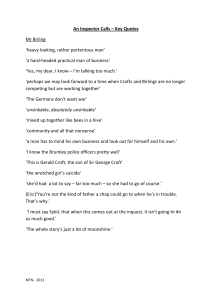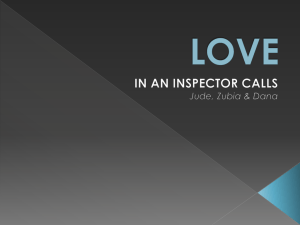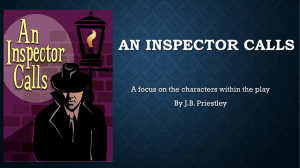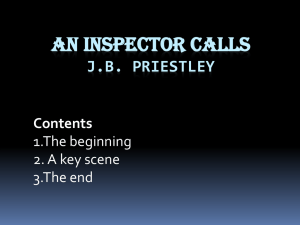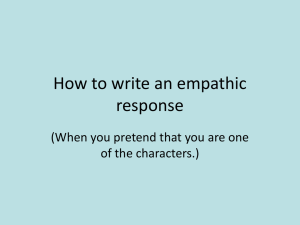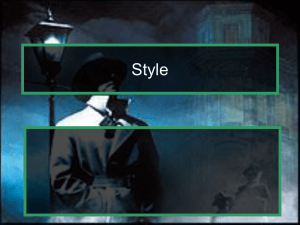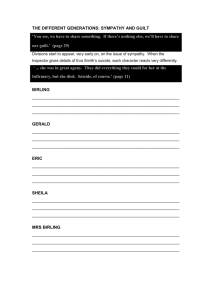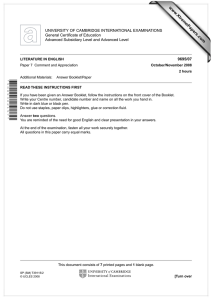File
advertisement
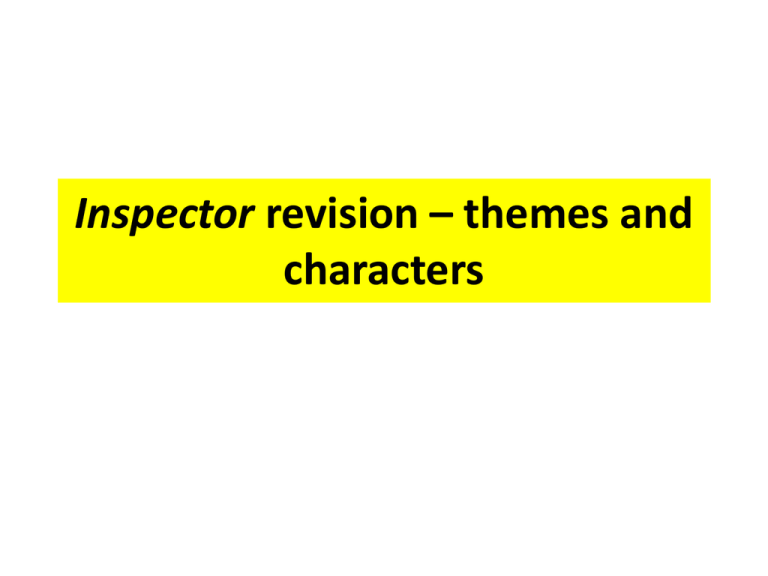
Inspector revision – themes and characters Themes: A Series of Conflicts • Social responsibility: collectivism vs individualism • Capitalism versus socialism (Priestley in favour of socialism) • Conflict between: – Classes (rich & poor/upper & lower) – Generations (younger and older generations/past & future) • Selfishness vs generosity • “Feeling” for your fellow humans Characters & Symbolism Goole: • A ghostly presence; the voice of socialism; the views/beliefs of Priestley • A voice of Christian morality (in Jesus’ teachings, all people are created as equals – “Love thy neighbour as thyself”) • The Birlings’ and Gerald’s past deeds coming back to haunt • Predicts what could/will happen in the future if we do not change Mr. Birling • Capitalism • Rugged individualism • Upwards mobility (moves from upper-middle to upper class) • Acquired wealth (not born into upper classes) • Self interest • Provides for his family, but does show love for them • Fails to accept responsibility for his past actions • Fails to appreciate the past and predict the future Mrs. Birling • “Cold”: lacks “feeling”/sympathy for others • Embodies an older generation of women, who have not known very many rights/freedoms • Cannot sympathise with her daughter • Protects but is not loving towards her son • Breaks with convention by correcting/reprimanding her husband • Represents entrenched upper-class values • Wants to preserve things as they are (e.g., Eva should know her place; lower classes should not be “impertinent”) • Refuses to accept responsibility for her actions Gerald • Up-and-coming business man – younger than Birling, but slightly older than Sheila and Eric • Seems to be following in footsteps of Birling • Motivated by capital/profit (engagement with Sheila = better business for Crofts and Birlings) • Links with Mr. & Mrs. Birling: business man like Birling; from old “country stock” (i.e., like Mrs. B., he was born into privilege) • Shows pity towards Eva, but forgets the Inspector’s “lessons” v. quickly – represents the possibility of changing for the better or continuing to act selfishly Sheila • Embodies hope that Priestley invests in the younger generation • Symbolises the possibility of change – begins “very happy with life”; ends by changing her attitude entirely; develops sympathy/“feeling” for others • Represents a generation of women who will soon experience greater freedoms and rights than their mothers’ generation (will Sheila become a suffragette?) • Unconventional – expects to be treated as an equal (attitude towards Gerald; disagrees with mother’s beliefs); she breaks the engagement with Gerald; she chooses the ring Eric • Has a drink problem – young man, already spoiled by capitalist excess (not everyone can afford to drink champagne, port etc.) • Uncomfortable with his life and family situation – isolated at start of play • Has natural sympathy for others and workers – disagrees with father’s decision to deny Eva & co higher wages • Forces himself upon Eva when drunk – corrupted by capitalist consumption • Accepts responsibility for actions – ashamed of himself an family – changes attitudes by end of the play BREAK Themes: A Series of Conflicts • Social responsibility: collectivism vs individualism • Capitalism versus socialism (Priestley in favour of socialism) • Conflict between: – Classes (rich & poor/upper & lower) – Generations (younger and older generations/past & future) • Selfishness vs generosity • “Feeling” for your fellow humans Characters & Symbolism Goole: • A ghostly presence; the voice of socialism; the views/beliefs of Priestley • A voice of Christian morality (in Jesus’ teachings, all people are created as equals – “Love thy neighbour as thyself”) • The Birlings’ and Gerald’s past deeds coming back to haunt • Predicts what could/will happen in the future if we do not change Mr. Birling • Capitalism • Rugged individualism • Upwards mobility (moves from upper-middle to upper class) • Acquired wealth (not born into upper classes) • Self interest • Provides for his family, but does show love for them • Fails to accept responsibility for his past actions • Fails to appreciate the past and predict the future Mrs. Birling • “Cold”: lacks “feeling”/sympathy for others • Embodies an older generation of women, who have not known very many rights/freedoms • Cannot sympathise with her daughter • Protects but is not loving towards her son • Breaks with convention by correcting/reprimanding her husband • Represents entrenched upper-class values • Wants to preserve things as they are (e.g., Eva should know her place; lower classes should not be “impertinent”) • Refuses to accept responsibility for her actions Gerald • Up-and-coming business man – younger than Birling, but slightly older than Sheila and Eric • Seems to be following in footsteps of Birling • Motivated by capital/profit (engagement with Sheila = better business for Crofts and Birlings) • Links with Mr. & Mrs. Birling: business man like Birling; from old “country stock” (i.e., like Mrs. B., he was born into privilege) • Shows pity towards Eva, but forgets the Inspector’s “lessons” v. quickly – represents the possibility of changing for the better or continuing to act selfishly Sheila • Embodies hope that Priestley invests in the younger generation • Symbolises the possibility of change – begins “very happy with life”; ends by changing her attitude entirely; develops sympathy/“feeling” for others • Represents a generation of women who will soon experience greater freedoms and rights than their mothers’ generation (will Sheila become a suffragette?) • Unconventional – expects to be treated as an equal (attitude towards Gerald; disagrees with mother’s beliefs); she breaks the engagement with Gerald; she chooses the ring Eric • Has a drink problem – young man, already spoiled by capitalist excess (not everyone can afford to drink champagne, port etc.) • Uncomfortable with his life and family situation – isolated at start of play • Has natural sympathy for others and workers – disagrees with father’s decision to deny Eva & co higher wages • Forces himself upon Eva when drunk – corrupted by capitalist consumption • Accepts responsibility for actions – ashamed of himself an family – changes attitudes by end of the play • Write 1 paragraph, summarizing how characters’ loyalties and partnerships change over the course of the play. Key Quotes/structural points Goole • Name – ghoul/ghost; haunts Birlings. • Won’t show photo(s) to more than one person at a time. But does this matter? • “This young woman, Eva Smith, was a bit out of the ordinary” (12). We might say this of everyone; every person is unique. • “I don’t like that tone” (15; Birling to Goole): Not intimidated/impressed by class/status. • “We have something to share… we’ll have to share our guilt.” (29) • “One Eva Smith has gone – but there are millions and millions and millions of Eva Smiths and John Smiths… all intertwined with our lives… We are members of one body.” (56) • People who don’t change their ways will “be taught in fire and blood and anguish” (56) Mr. Birling • Opening stage direction • Page 4: Family or business first? • Pages 6-7: Two long speeches; which sections are most useful? • Page 8: Honours list; Gerald’s mother – importance? • Page 10: individualism vs collectivism • Pages 14-15: capitalist self interest. Sheila • Opening stage direction • Page 3: dutiful wife, following her husband’s lead? • 23: Individualism/collectivism? Responsibility? • 24: Motivation for her actions? • 34: Attitude towards “men”? • 40: Change in attitude towards Gerald after truth is revealed? • 41: How has Sheila’s attitude changed, mid-way in the play? • 71: How has Sheila changed? What concerns her most? Gerald • P. 3: Despite outward confidence, seeks reassurance from Sheila. • P. 4: Seems to share Birling’s values? • 27: Does Gerald want to protect Sheila’s feelings? • P. 35: Like Goole, Gerald thinks there’s something different about Eva? • Pp.36-37: Gerald’s motivation for helping Eva/Daisy? • P. 39: Gerald beginning to “share” the “guilt”? • P. 40: How does revealing the truth affect Gerald and Sheila’s relationship? • P. 63: Does Gerald still want to “share” responsibility or “guilt”? Mrs. Birling • P.1: Description in opening stage direction • P.3: Expectations of/attitude towards marriage • P.2, p.4: Authority/power/status over husband • • • • P.31: Authority figure – she is a matriarchal figure Attempts to use status to intimidate P. 38: Mrs. B’s authority over her daughter slipping away P. 43: Mrs. B things the people – especially lower classes – should know their place • P. 44: Mrs. B shows no signs of regret or of shared guilt • Pp. 47-48: Mrs. B’s self-interestedness leads her to judge her son; Sheila has worked out the “links in the chain,” but her mother has not. • P. 63: Towards end of play, Mrs. B resumes (takes back) her position of authority Eric: Eric absent for middle section of the play – when Sheila changes – and then central to the final act • • • • P. 2: Stage direction P. 3: Isolated from his family/unsure of himself P. 4, p.6: Conflict with father/questions his father’s decisions Pp. 14-15, 58: Questions father’s individualism & his actions • P.51: Eric’s words suggest that Eva/Daisy was not yet a prostitute – so not yet fully corrupted by social inequality P. 52: Eric admits his selfish actions; symbolic of corruptive power of capitalism/wealth 53: Eric steals money from wealthy father – symbolic of socialist values of sharing wealth amongst all people • • • • • P. 55: Eric passes judgement back to his mother; family on brink of collapse P. 57: Eric ashamed of his family and their values P. 64: Eric and Sheila changed; they are closer/united, but now more distant from their parents & Gerald (Priestley’s belief that hope lies with the younger generation) Inspector mock, Wednesday after halfterm break • 2 pages, answering the following question: - Concentrate on detailed quotations & analysis. - Don’t retell the story - Try to offer at least two interpretations of each quotation: “The audience might interpret these words as meaning that... However, an alternative reading would be...”
